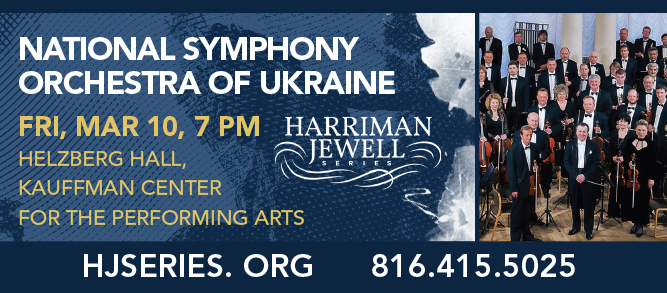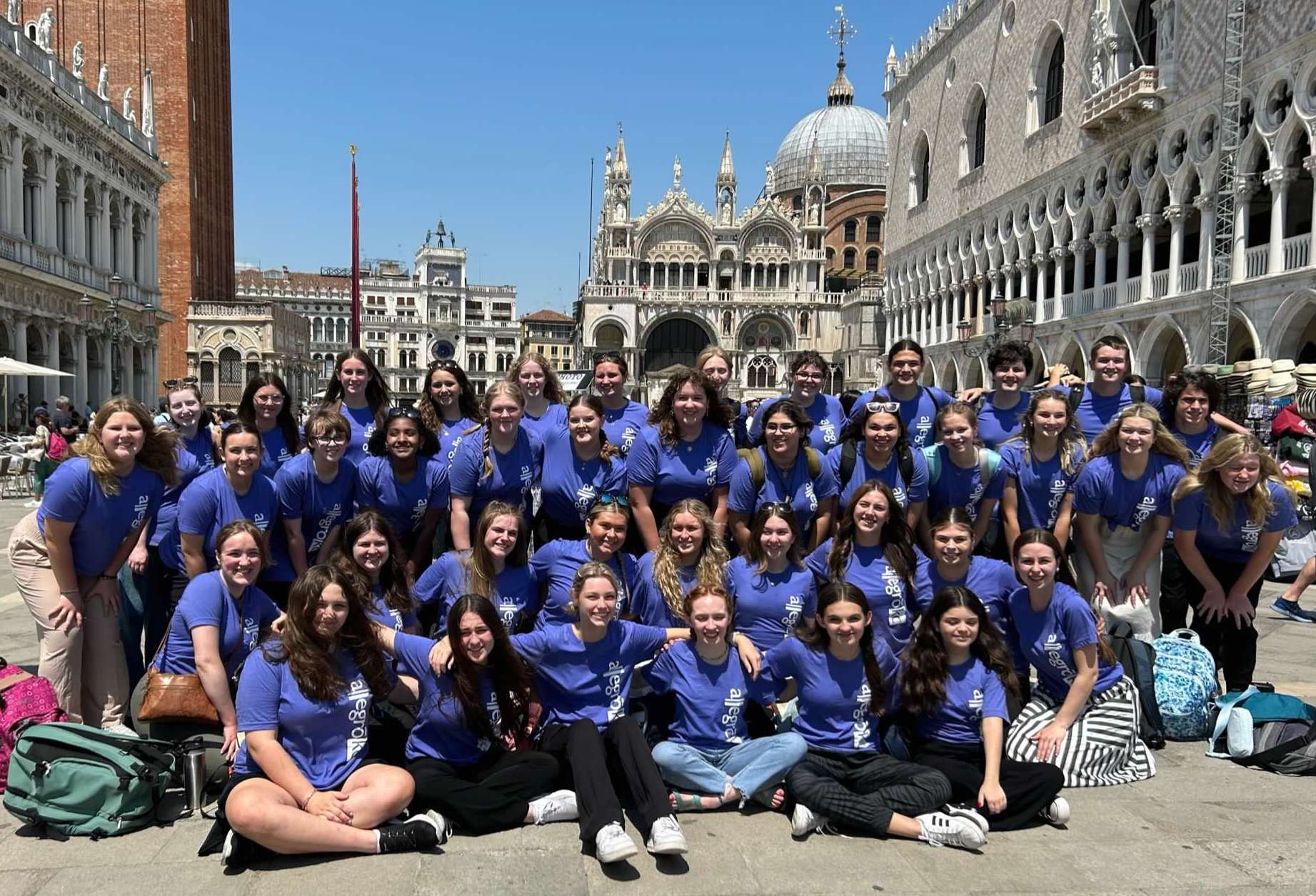BEHIND BARS: Lyric Opera takes a stab at problematic prison opera (review)
By Paul Horsley
Dead Man Walking is like the Clockwork Orange of opera. You might appreciate its artistic achievement, admire its remarkable attention to detail, even recognize its potential for redeeming social value. But you really don’t have fun, and at the end you find yourself asking whether you’ve gained anything from the grueling experience of sitting through it. The Lyric Opera of Kansas City presented the 17-year-old opera for the first time locally, and it was a well-dressed-up production led by the savvy stage director Kristine McIntyre and deftly conducted by Steven Osgood. Several singing actors made strong impressions in what must be some of contemporary opera’s most challenging roles, and R. Keith Brumley’s set designs were suitably bleak and soul-draining. But I remain convinced, as I was when I first saw the opera in 2002, that it is a shrewdly manipulative piece of sensationalism disguised as a “spiritual love story.”
Contemporary opera has long struggled to find a niche in American cultural life. Toward creating a “hit,” many have steered their dramatic and musical styles toward the vernacular of Broadway, at which point you find yourself asking where the line is between opera and musical theater (if it matters). Some operas have found poetic and often subtle ways of representing historic events, using the unique qualities of melody and harmonic substance to underscore what might otherwise be a bland documentary retelling of stories we already know. Others have found a place in the repertoire by adapting successful novels, plays or movies, something that (with the exception of the more recent phenomenon of film) is a centuries-old tradition in opera. Yet even with the latter, one has often suspected that the impact draws more from the inventiveness of the original than from anything the composer and librettist might have added to it. The problem is, if you’re not a great composer, you can’t write a great opera.
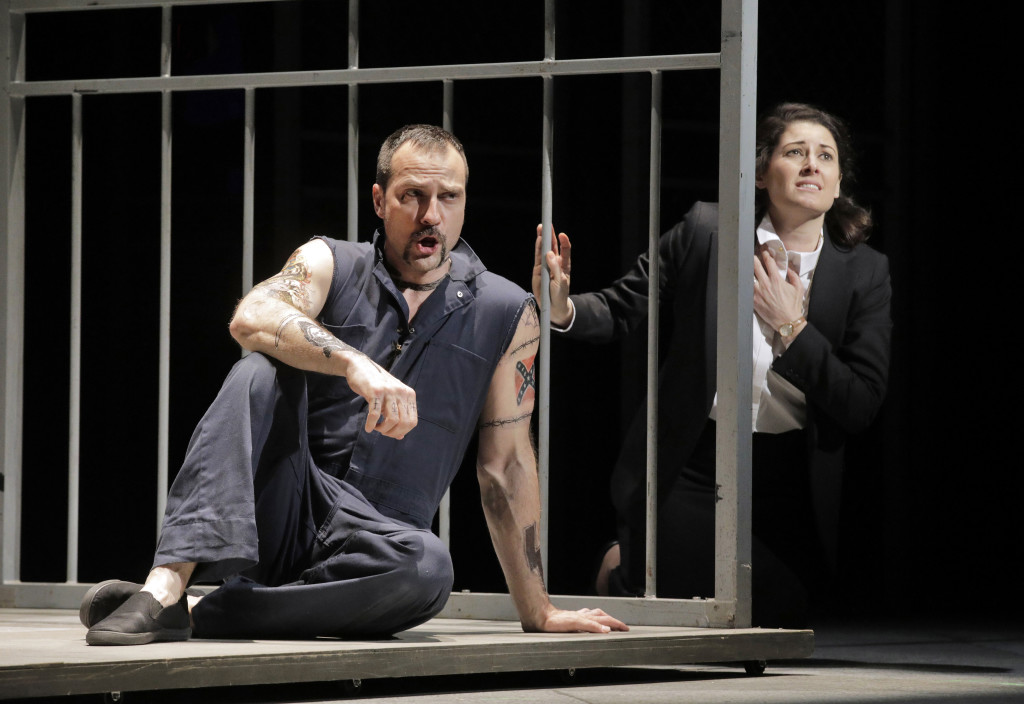
Dead Man Walking the opera is a sort of hybrid, based purportedly on the discursive memoir by a real nun about her experiences with death-row inmates in Louisiana, but drawing on aspects of a 1995 film adaptation of the same book. The idea was that to make an effective drama, we needed a central relationship (between the book’s author, Sister Helen Prejean, and a single, unrepentant inmate) around which could swirl some key auxiliary relationships. In 2000, Terrence McNally created a highly effective libretto for composer Jake Heggie built on the same premise. Heggie was writing his first opera, and although the result has been one of the most frequently performed of American operas, it remains a flawed piece of musical drama.
To be sure, the audience at the Lyric Opera’s opening performance on March 4th—at the glittering Kauffman Center, whose opulence contrasted almost grotesquely with the stark, gritty Angola prison the Lyric tried to re-create onstage—seemed to take this all in stride, judging both from the attentiveness throughout and the sniffles heard in the hall as Act II progressed. But whereas some first-timers are convinced by this opera’s soaring tale of crime, retribution, confession and repentance, I find it a bizarre stretch—for the sake of artistic license?—of the premise of Sister Helen’s book.
Does the opera work on its own terms? Yes and no. If we believe, as many Americans do, that some people are “bad” and can only be healed by locking them in cages or killing them, then there is really no other satisfying way for Dead Man Walking to end than to rid the world of the rapist-murderer, Joseph De Rocher. (At the end he prays that his death will help others find peace, and as he is risen on a cross-like berth to die, repentant at last, the Christ-like imagery becomes confusing to the senses.)
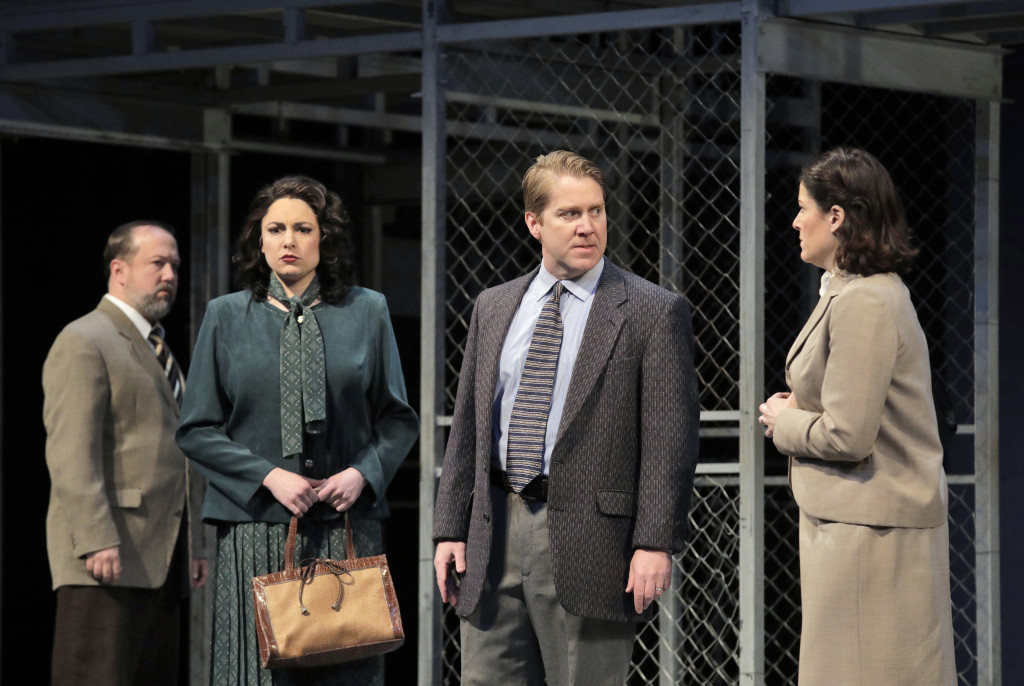
But if you believe that people can change, as the “real” Sister Helen clearly does, or that men and women can indeed find a sort of redemption through mental healing and other forms of social rehabilitation, then the execution of De Rocher is simply a tedious exercise in American Retribution. And if dramatic “resolution” in this opera is possible only through De Rocher’s confession and death, then the conclusion feels contrary to Prejean’s belief that a State-sponsored murder sets into motion in a whole new cycle of retribution. Or as the character De Rocher sings in the opera, to the “State” itself as it were: “If y’all think killing’s so bad, look at what you’re doin’.”
Yes, the authors have perhaps willfully avoided a sense of “resolution” in this opera (life sometimes ends messily), but as the libretto is essentially based on the idea that we’ll all join hands once Joseph admits his guilt, his final confession is the closest thing to resolution we’re offered. Instead, we just feel empty. (As suicidal as I often feel at the end of Wozzeck, I’m always left with a sense of warmth, even love, for the hapless central character whose plight was created by huge social forces beyond his control.)
What I miss most in Dead Man Walking is beautiful music, soaring operatic melodies that take us through the emotional parts and create a satisfying operatic experience. There are a few moments of well-drawn, aria-like lines, such as Sister Helen’s “We will walk together,” or the gorgeous Act II duet between Helen and Sister Rose, which on Saturday was touchingly brought off by Kate Aldrich (Helen) and Karen Slack (Rose).
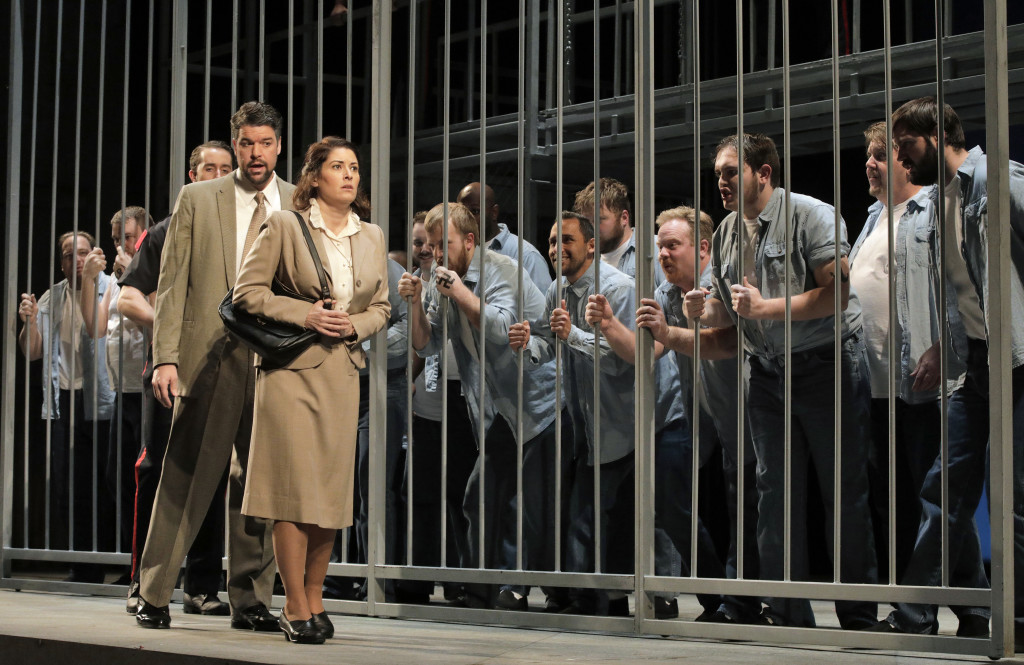
There are also some powerful if crass choruses, such as the final Lord’s Prayer, which begins on a monotone (led by tenor Casey Candebat as Father Grenville) though for some reason builds to a deafening quadruple forte. The ensembles of grieving parents and others are often intentionally fractured and unpretty, appropriate to the occasion but certainly not much fun to listen to. Overall, the moments of sweet, arching tunes during this melodrama are few and far between, and the thick orchestration of the accompaniment often works against these singers’ mostly medium-sized voices.
David Adam Moore (De Rocher) has a sweet baritone but he is so frequently called upon to chew up his vowels in order to sound like a Cajun that after three hours of this you feel your head is going to explode. In fact throughout the opera one felt that good diction was being undermined by this pointless attempt at verisimilitude.
Kate Aldrich conveyed Sister Helen’s vulnerability more than her strength, singing with warmth but sometimes lacking the sort of steely interior that must have been required to face these raw-boned inmates. Maria Zifchak sang beautifully as Joseph’s mother, her voice well-seasoned and capable of sustained lines. Jeffrey Beruan was a commanding Benton, though again he struggled with the jaw-wrenching drawl. Most satisfying was Daniel Belcher as Owen Hart, father of one of the murdered children: His pathos was palpable, and his honeyed, personable baritone sounded as beautiful as I’ve ever heard it. The most dramatically touching moment of the evening came when he and Helen made steps toward reconciliation: This brief glimmer of hope brought out the best in both singers, and offered welcome respite from the horrors all around.
Dead Man Walking plays through March 12th at the Kauffman Center. Call 816-471-7344 or go to kcopera.org.
Photo at top: Armando Contreras, Kate Aldrich, David Adam Moore, Jeffrey Beruan, Casey Candebat, Rhys Lloyd Talbot and chorus / Photo by Cory Weaver, Lyric Opera of Kansas City.
To reach Paul Horsley, performing arts editor, send an email to paul@kcindependent or find him on Facebook (paul.horsley.501) or Twitter (@phorsleycritic).
Features
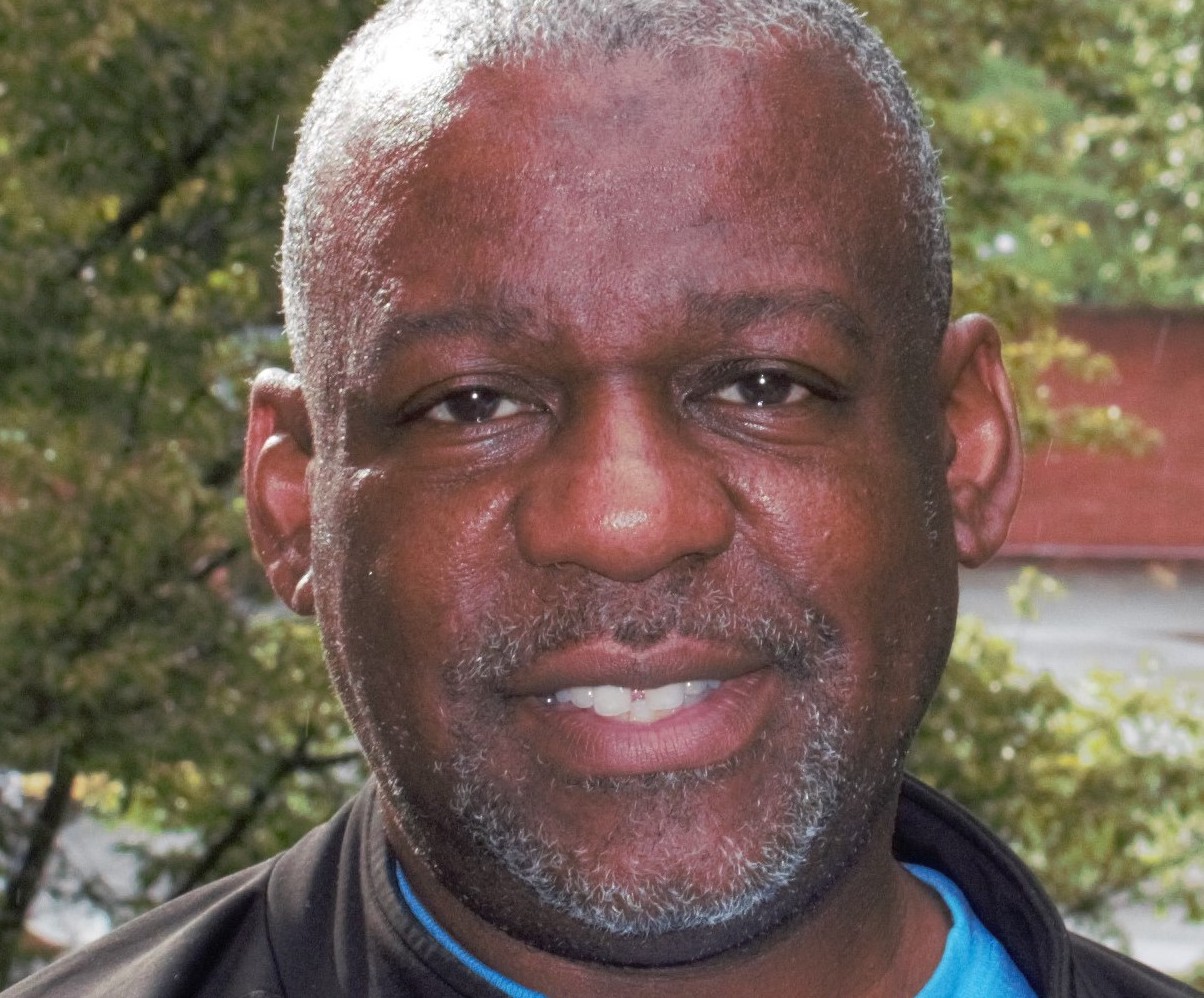
Tyrone Aiken danced prodigiously as a youth, trained at The Ailey School as a young adult, worked as a professional dancer at the height of the New York dance ferment,…
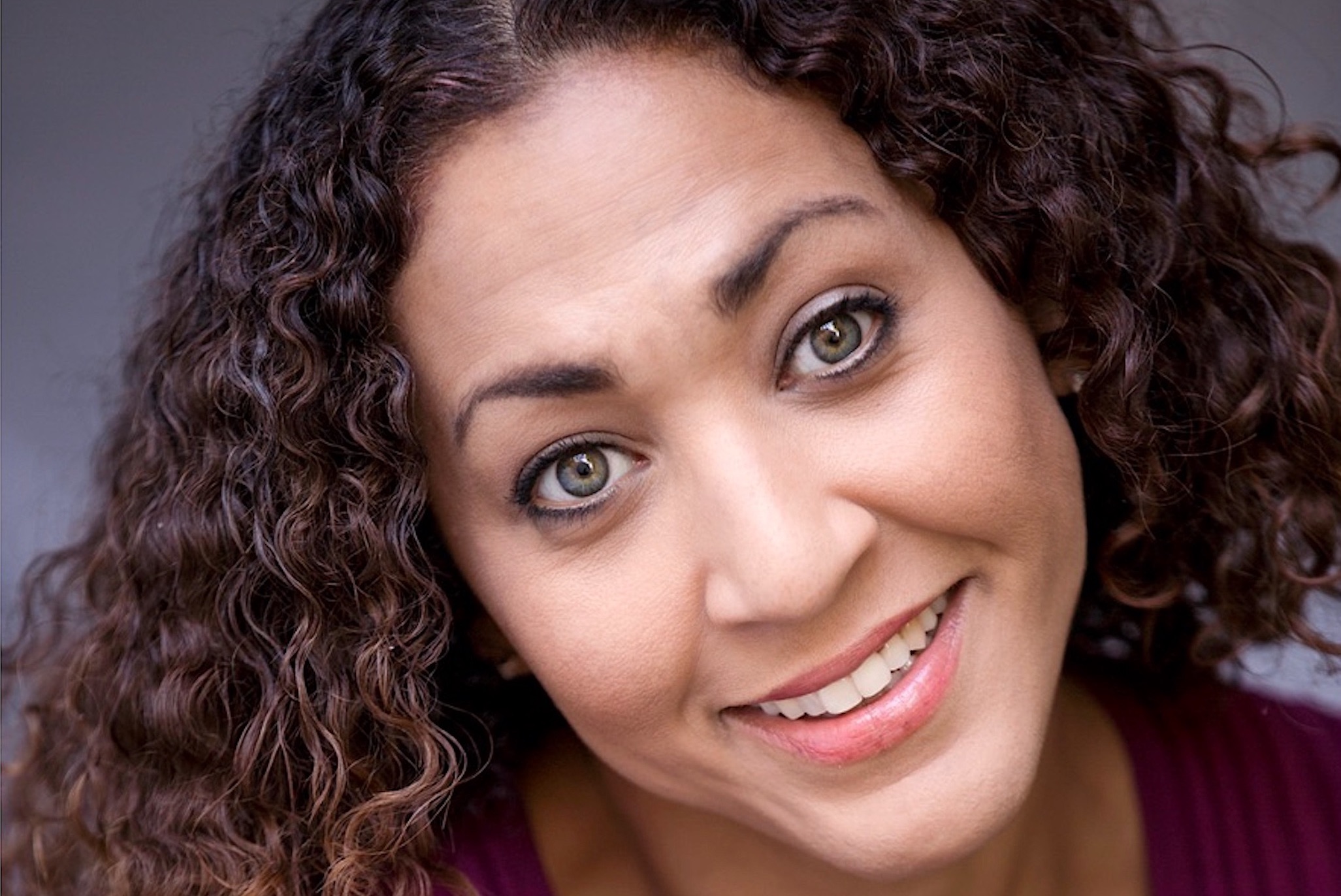
CAROLINE DAHM Dancer, choreographer, producer, master teacher, adjunct dance professor at The UMKC Conservatory, assistant director at Wylliams/Henry Contemporary Dance Company What I love about the Kansas City performing-arts scene: Kansas…

It’s difficult to remember what the Kansas City skyline looked like 20 years ago, before the Kauffman Center for the Performing Arts began to take shape at 16th and Broadway.…


